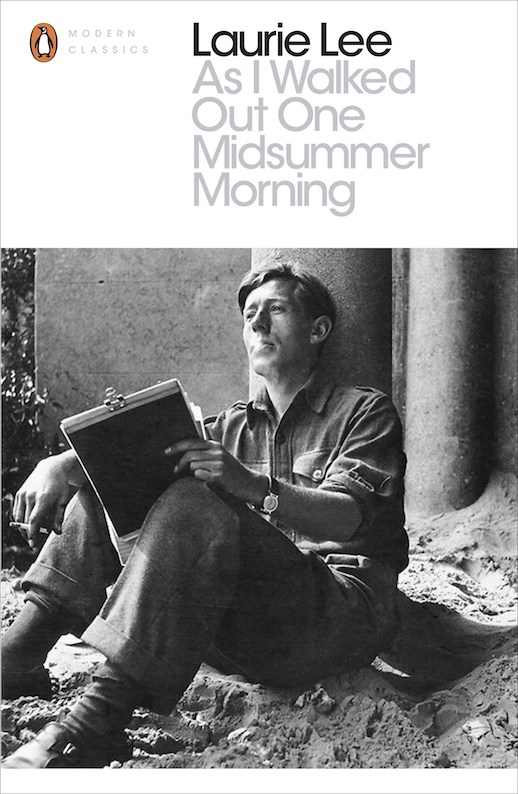By Neil Sentance
‘The stooping figure of my mother, waist-deep in the grass and caught there like a piece of sheep’s wool, was the last I saw of my country home as I left it to discover the world.’
So begins Laurie Lee’s memoir As I Walked Out One Midsummer Morning, first published in 1969, the second in his celebrated autobiographical trilogy. That liminal moment, between the leaving and the left-behind, the yielding certainties of home and the first bold steps out of the enfolding valley, so beautifully rendered in that opening line, has resonated with me for over twenty years.
In the midwinter of 1990 I was an exchange student in the city of Groningen in the northeast Netherlands. I was 20 years old, not long away from my home in the breadbasket of the English East Midlands, perhaps a little half-baked as I stood, unsteady, on the threshold of adulthood. I was in Holland to study the contourless polderlands and brittle mudflats, defiant flood defences and the deltas of three great rivers. Inevitably, I spent most of my measureless time in bars and coffee shops, idly watching the low-angled sun gild the ancient gables of the redbrick buildings opposite our student apartments, talking football with ardent Dutchmen, or watching old movies with a girl I knew from Padua. Or otherwise I’d escape the subtopia of corrugated hangars on the campus, to find the land of sleety waterways and rimy air, still looking, on occasion, like a well-worn Flemish book of hours handmade by Breughel, skaters, scarves, frozen canals and all.
A friend from home had sent me off with Laurie Lee’s book, with a tip of a felt hat toward my roaming tendencies. Immediately I was enraptured. I read slowly, allowing its full voluptuary embrace, its singing sensuousness. I could not resist its romantic dolour, its kaleidoscope of sun-splintered and splinted images as I walked out with Laurie from the honeyed Cotswolds of 1933, to simmering London and then to Spain, across the sierras and plains, through a land of almost medieval stasis, superstition, poverty and beauty, a country on the cusp of a kind of horrifying European future-lab in the shape of the Spanish Civil War.
From here I devoured Laurie Lee’s back-catalogue, asequentially. First, Cider with Rosie, a wonderfully warm evocation of a lost English countryside, a lost way of life, rich and romantic, but with dark undertones, often forgotten by critics in their accusations of rose-tintedness. Then the lyric poems, surreal, full of song flight, sometimes oblique, often rueful; A Rose for Winter, his record of his return to Spain in the early 50s, in the new Franco era, to a Spain shattered, scarred, scarified. An Irishman I met in a coffee shop leant me the book of Lee’s essays I Can’t Stay Long (which includes ‘A Gift from the Sea’ recounting a trip to Groningen in the 1960s). Then, a year after my return from Holland, came the completion of the autobiographical trilogy, the short, hard, stone-cut A Moment of War.
These books have been with me ever since, friendly and sturdy on shelves above my bed in bedsits to bungalows, dog-eared, digested, foxing, spine-buckled, unravelling – loved. I’ve bought countless copies as gifts, particularly for new friends – they’ve acted as a kind of friendship test: if you loved Laurie Lee, you’re a pal for sure. I made a pilgrimage to Gloucestershire a year or so after Lee’s death, visited Slad’s Woolpack pub, and its mossy-mouthed valley, the churchyard with his grave at that point waiting its headstone. Plans were made with an adventuring friend to walk Spain, but he went instead to live in Washington, and the plan awaits taking down from the dusty shelf, its slats in need of re-battening.
Laurie Lee was born a hundred years ago on 26 June 1914. His centenary has been less noticed than that of his fellow poet Dylan Thomas, but many celebratory events have been signposted. His books have been reprinted, with introductions from luminaries like Robert Macfarlane and Jan Morris; talks and readings organized at poetry festivals; his intense illusory paintings exhibited at Stroud Museum and published in an artbook, with a commentary from his daughter Jessy. The British Library have issued a wonderful CD of some of his many radio broadcasts and interviews, capturing that warm voice, so round and full; and the BBC are producing the third filmed version of Cider with Rosie.
I still re-read Laurie Lee’s book at intervals. In doldrums times, they act as consolations and restoratives, like literary chicken soup and rice. Or they inspire freckled dreams, of walking lucent caminos next to burnt umber Spanish fields, speaking to sun-sawn natives in a tongue I don’t know, full of wine I haven’t drunk and bowing a violin I can’t play…
Water and Sky, the first book by Neil Sentance, was recently published by Caught by the River / Little Toller Books. Buy a copy here.
